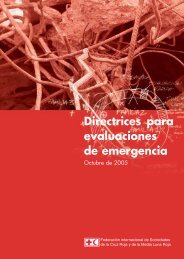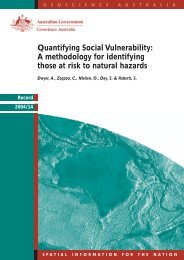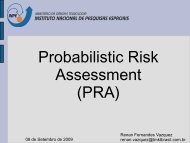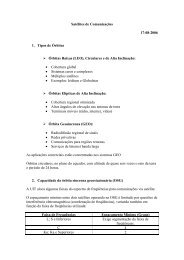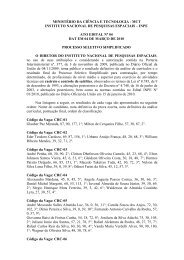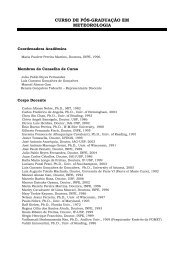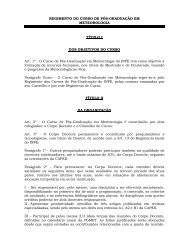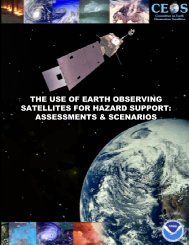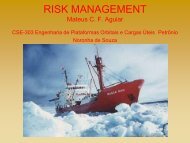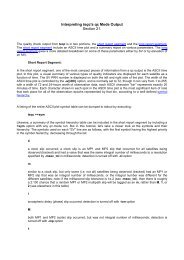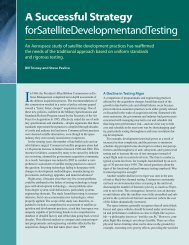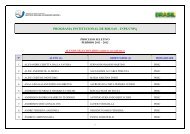Living with Risk. A global review of disaster reduction initiatives
Living with Risk. A global review of disaster reduction initiatives
Living with Risk. A global review of disaster reduction initiatives
Create successful ePaper yourself
Turn your PDF publications into a flip-book with our unique Google optimized e-Paper software.
6<br />
<strong>Living</strong> <strong>with</strong> <strong>Risk</strong>: A <strong>global</strong> <strong>review</strong> <strong>of</strong> <strong>disaster</strong> <strong>reduction</strong> <strong>initiatives</strong><br />
Regional Commissions<br />
The regional economic commissions were<br />
founded by the Economic and Social Council for<br />
the purposes <strong>of</strong> promoting greater economic<br />
cooperation <strong>with</strong>in and between regions,<br />
contributing to the economic and social development<br />
<strong>of</strong> a region, coordinating actions directed<br />
towards this end and reinforcing economic relationships<br />
among the countries and <strong>with</strong> the other<br />
nations <strong>of</strong> the world. The five commissions are<br />
the Economic Commission for Europe (ECE),<br />
the Economic and Social Commission for Asia<br />
and the Pacific (ESCAP), the Economic<br />
Commission for Latin America and the<br />
Caribbean (ECLAC), the Economic Commission<br />
for Africa (ECA) and the Economic and<br />
Social Commission for Western Asia (ESCWA).<br />
The secretariats <strong>of</strong> these regional commissions<br />
are part <strong>of</strong> the United Nations Secretariat and<br />
perform similar functions including <strong>disaster</strong><br />
<strong>reduction</strong> activities, although adapted to the<br />
needs and priorities <strong>of</strong> the region <strong>with</strong> which<br />
they are entrusted.<br />
The secretariat <strong>of</strong> the Economic and Social<br />
Commission for Asia and the Pacific (ESCAP)<br />
Headed by an Executive Secretary at the level <strong>of</strong><br />
Under-Secretary-General <strong>of</strong> the United Nations,<br />
the ESCAP secretariat is located in Bangkok,<br />
Thailand. This Commission, comprising 52<br />
members and associate members, promotes capacity-building<br />
in developing countries and<br />
contributes to the mainstreaming <strong>of</strong> <strong>disaster</strong> <strong>reduction</strong><br />
into sustainable development <strong>with</strong> particular<br />
focus on water-related <strong>disaster</strong>s, especially floods.<br />
Activities in this context include the organization <strong>of</strong><br />
seminars and training courses for flood control and<br />
management, a regional overview <strong>of</strong> experiences in<br />
water-related <strong>disaster</strong> management in Asia and a<br />
regional project for "strengthening capacity in<br />
participatory planning and management for flood<br />
mitigation and preparedness in large river basins".<br />
In cooperation <strong>with</strong> the World Meteorological<br />
Organization (WMO), ESCAP conducted a<br />
regional survey, which has contributed to the<br />
strengthening <strong>of</strong> regional cooperation in flood forecasting<br />
and <strong>disaster</strong> <strong>reduction</strong>. Similarly, ESCAP<br />
provided advisory services to the secretariat <strong>of</strong> the<br />
Mekong River Commission on the formulation <strong>of</strong><br />
the regional strategy for flood management and<br />
mitigation.<br />
ESCAP secretariat<br />
The United Nations Building<br />
Rajadamnern Nok Avenue<br />
Bangkok 10200, Thailand<br />
Tel: (+66-2) 288 1234<br />
Fax: (+66-2) 288 1000<br />
Web site: www.unescap.org<br />
The secretariat <strong>of</strong> the Economic Commission for<br />
Latin America and the Caribbean (ECLAC)<br />
The ECLAC secretariat, led by an Executive<br />
Secretary, is based in Santiago de Chile <strong>with</strong> subregional<br />
headquarters in Mexico City and Port-<strong>of</strong>-<br />
Spain, Trinidad and Tobago, country <strong>of</strong>fices in<br />
Bogotá, Brasilia, Buenos Aires and Montevideo<br />
and a liaison <strong>of</strong>fice in Washington, D.C. The<br />
Commission, <strong>with</strong> its 41 member States and seven<br />
associate members, plays an active role in <strong>disaster</strong><br />
<strong>reduction</strong>, concentrating especially on the socioeconomic<br />
impact <strong>of</strong> natural and other related<br />
hazards. In this context, ECLAC organized a<br />
series <strong>of</strong> inter-agency assessment studies on the<br />
macroeconomic impact <strong>of</strong> natural <strong>disaster</strong>s in the<br />
region since the earthquake in Managua in 1972,<br />
including the 1999 floods and landslides in<br />
Venezuela, the earthquakes in Colombia (1999) and<br />
in El Salvador (2001), Hurricanes Georges, Mitch<br />
(1998) and Keith (2000), as well as climatic variations<br />
like the El Niño current's effects (1997-1998)<br />
and the severe drought that affected Central America<br />
in 2001 and the earthquake <strong>of</strong> El Salvador in<br />
2001. ECLAC has over the years developed a<br />
methodology to assess the impact <strong>of</strong> <strong>disaster</strong>s on<br />
development including an environmental impact<br />
analysis, a gender perspective and a comprehensive<br />
analysis <strong>of</strong> the macroeconomic impact <strong>of</strong> <strong>disaster</strong>s<br />
and its effect on reconstruction plans. Currently,<br />
this methodology is being disseminated <strong>with</strong> the<br />
support <strong>of</strong> organizations such as the Inter-American<br />
Development Bank, the Pan American Health<br />
Organization (PAHO)/WHO and the World<br />
Bank and training is being provided for its use.<br />
ECLAC is also advancing the development <strong>of</strong><br />
indicators <strong>of</strong> vulnerability and risk, in terms <strong>of</strong><br />
measuring the economic, social and environmental<br />
impact <strong>of</strong> extreme natural phenomena. In addition<br />
to these activities, the Commission has implemented<br />
training programmes for small island developing<br />
states vulnerable to hurricanes through its<br />
regional <strong>of</strong>fice for the Caribbean.<br />
306



